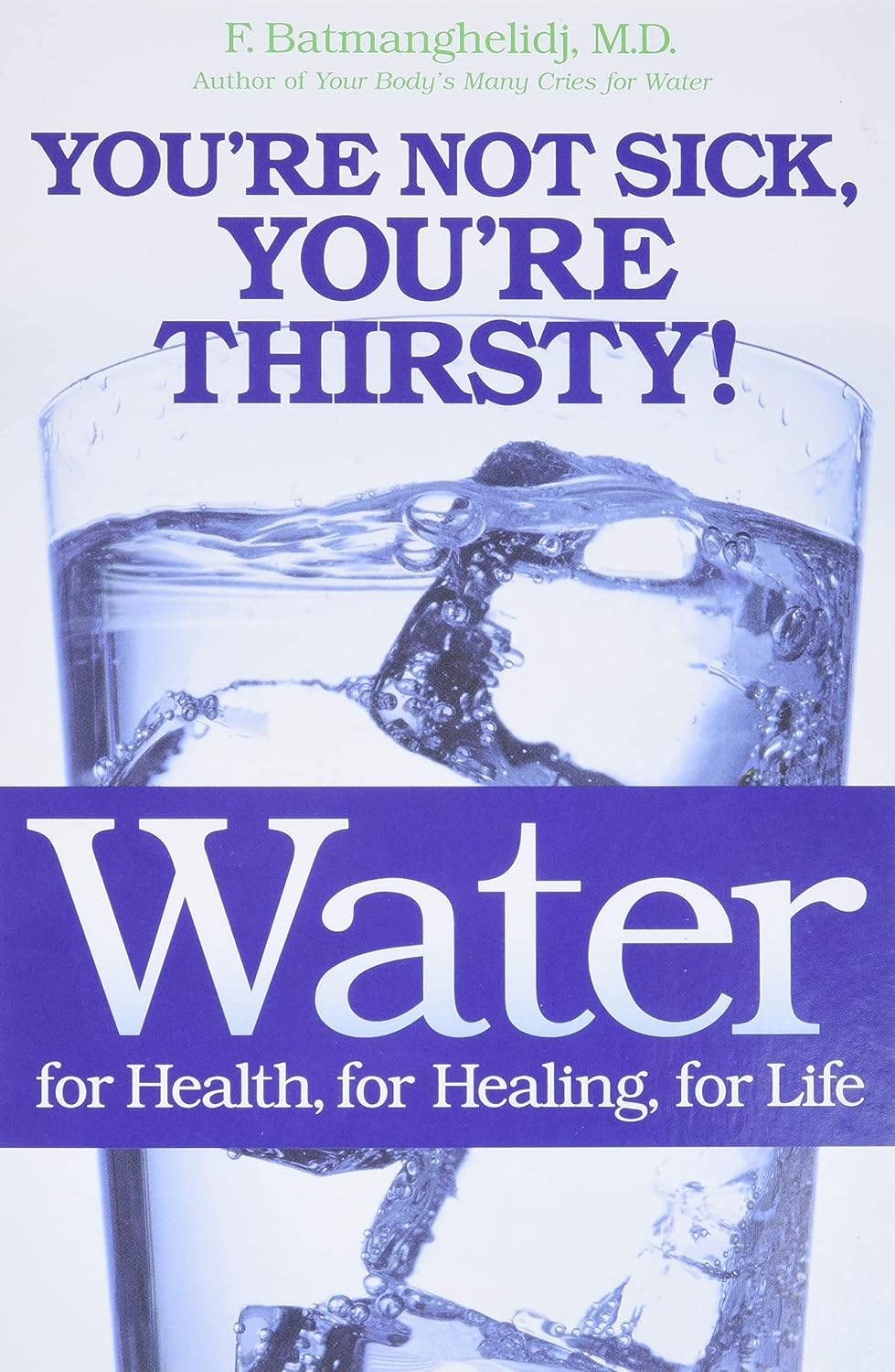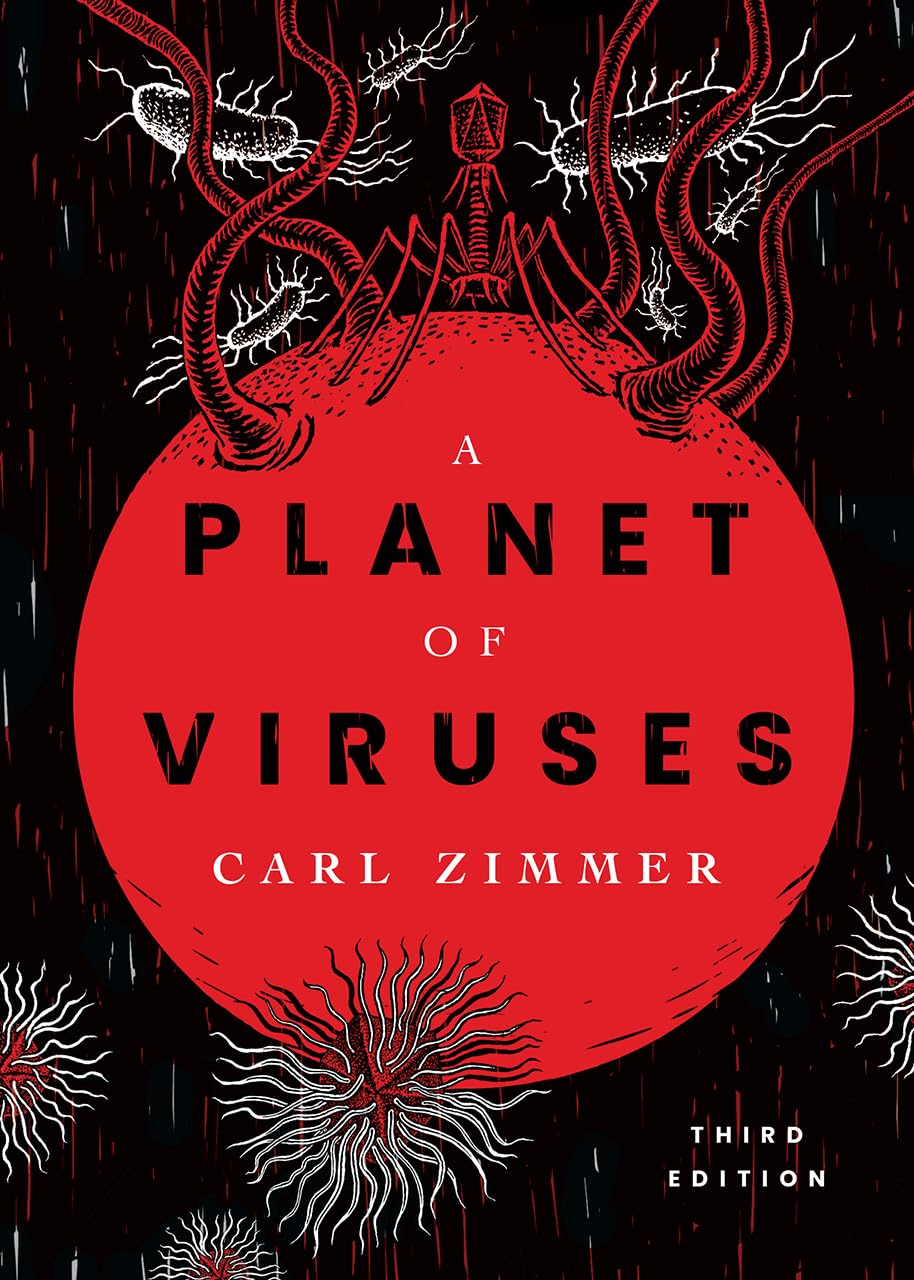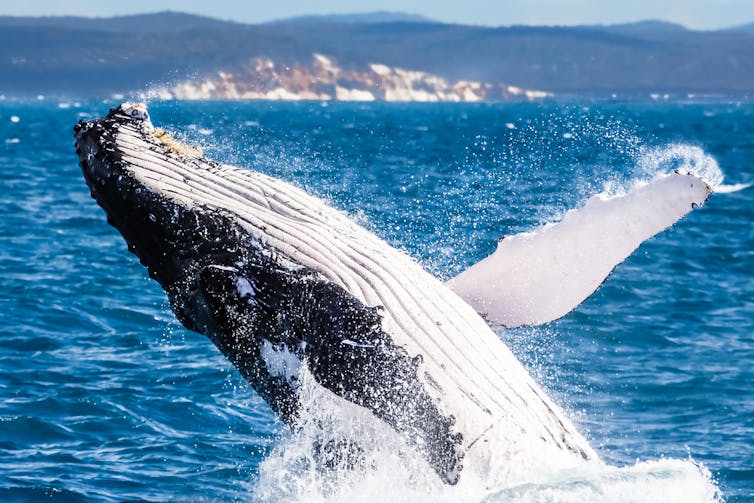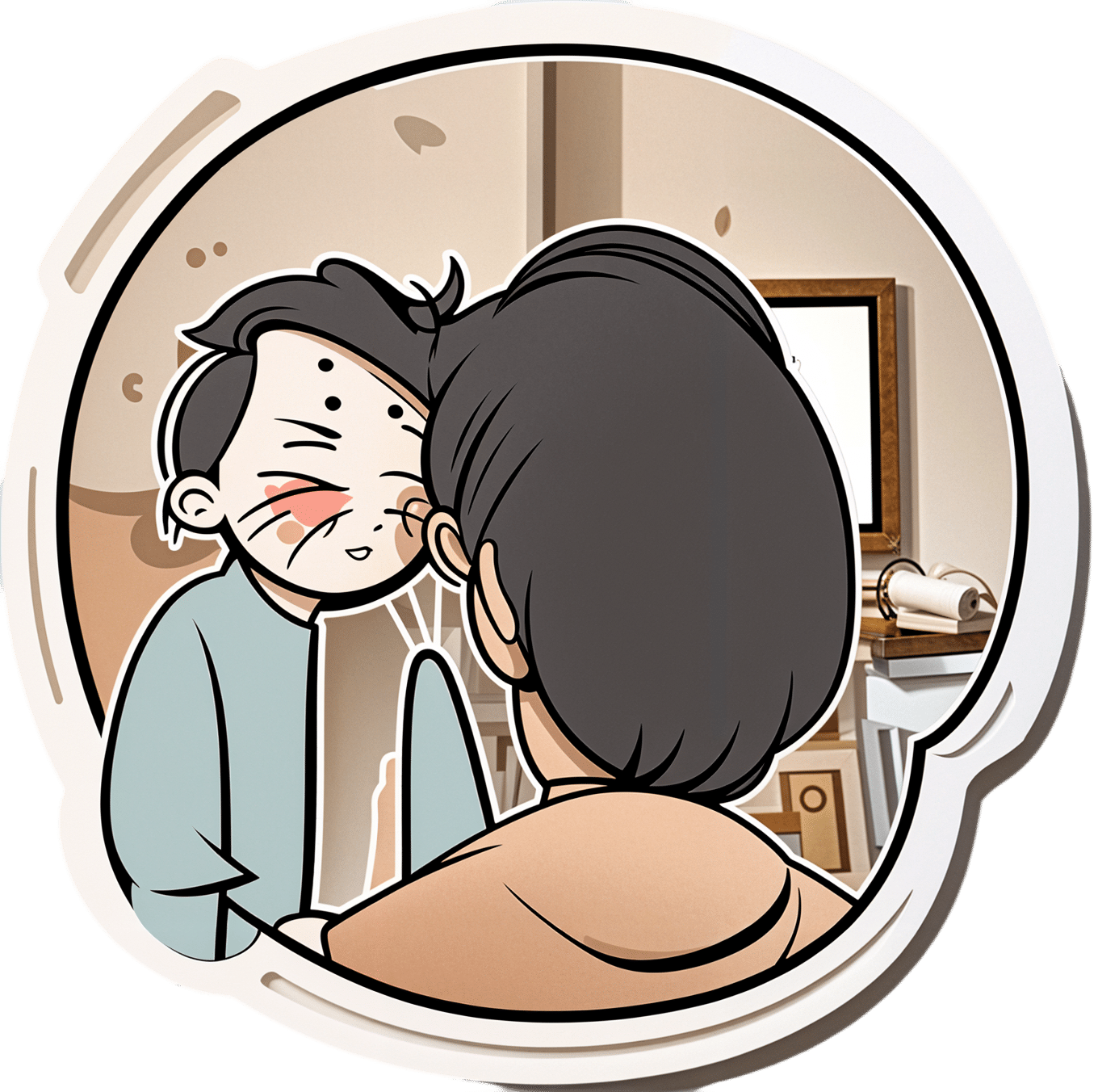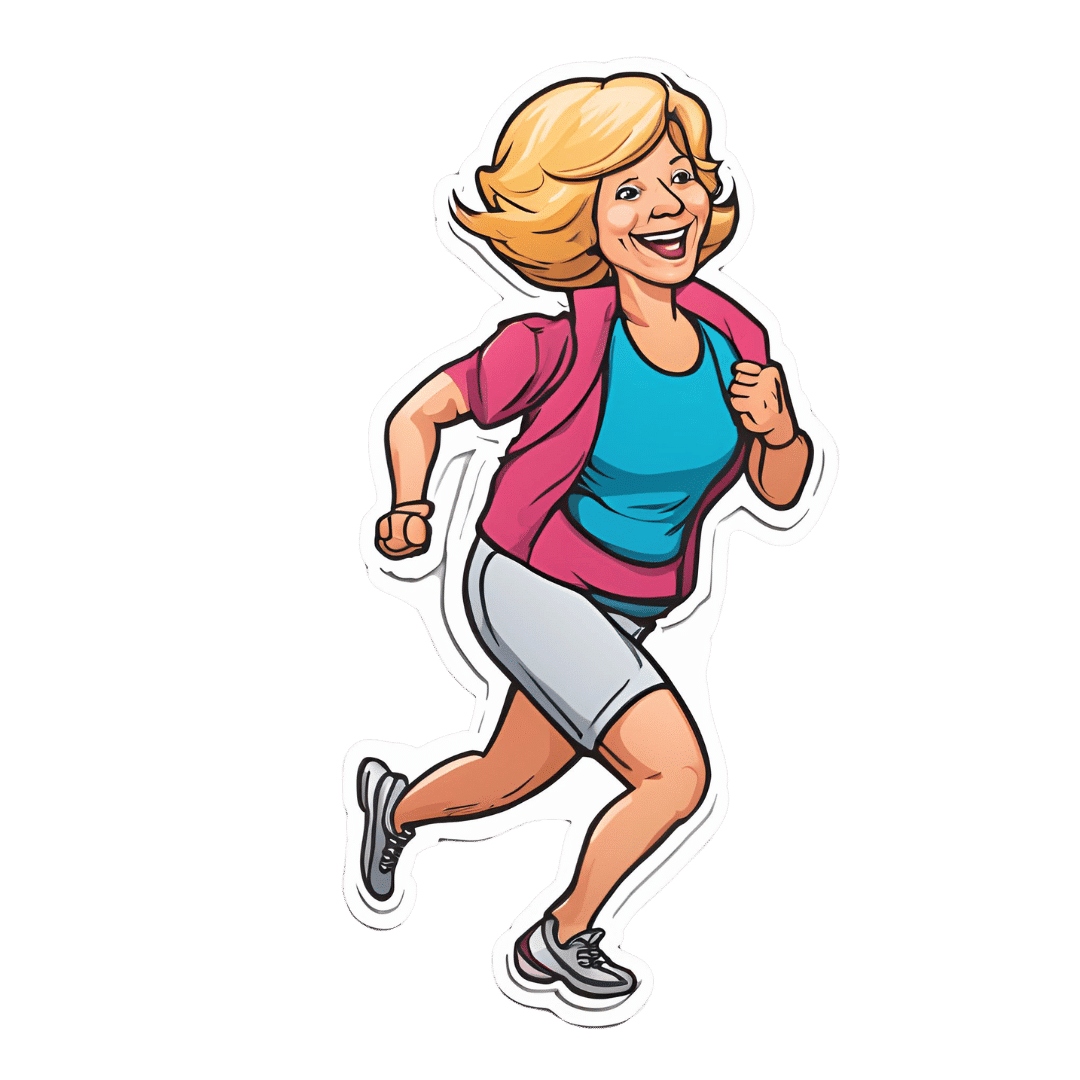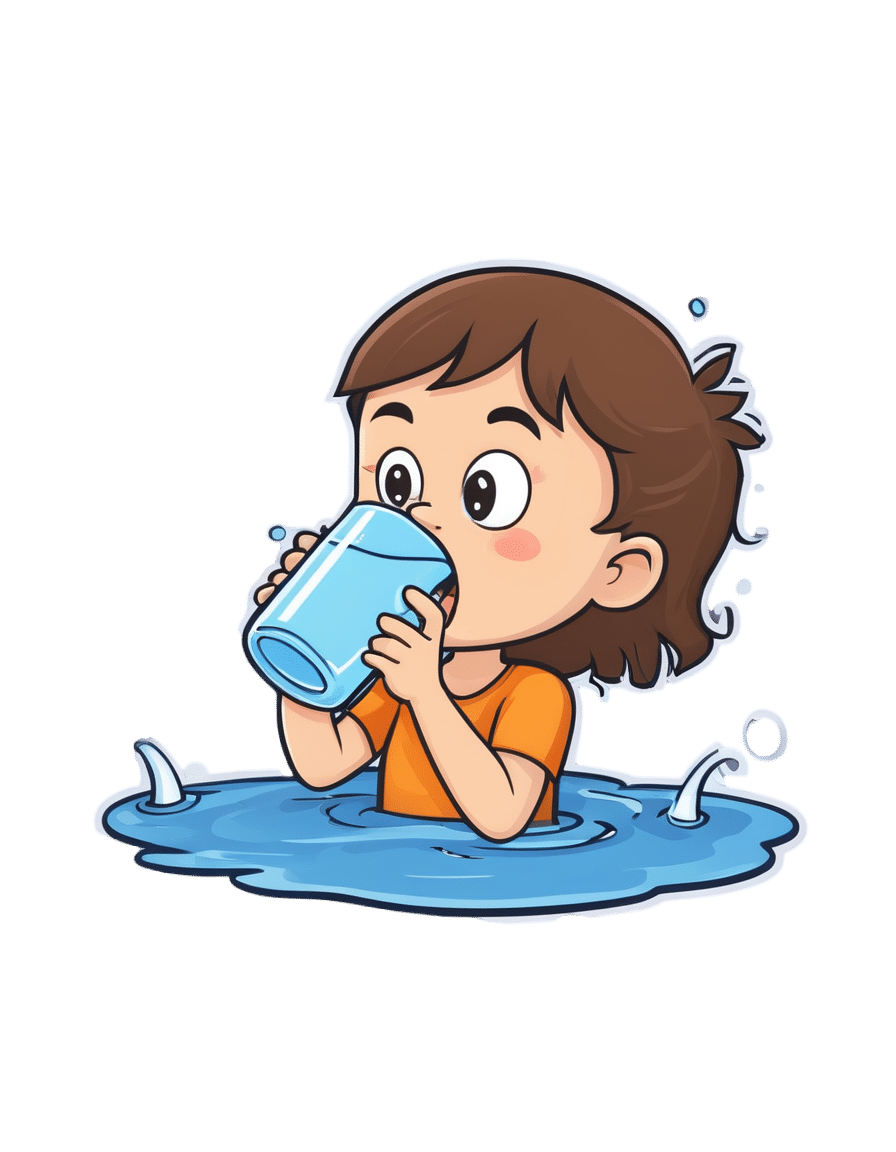
Why You Don’t Need 8 Glasses Of Water Per Day
10almonds is reader-supported. We may, at no cost to you, receive a portion of sales if you purchase a product through a link in this article.
The idea that you need to drink eight glasses of water daily is a myth. For most people most of the time, this practice will not make your skin brighter, improve mental clarity, or boost energy levels. All that will happen as a result of drinking beyond your thirst, is that you’ll pee more.
A self-regulating system
Our kidneys regulate hydration by monitoring blood volume and salt levels. When blood becomes slightly saltier or its volume drops, such as through sweating, the kidneys absorb more water into the bloodstream. If needed, the body triggers thirst signals to encourage fluid intake.
In most cases, you can rely on your body’s natural thirst cues to manage hydration. Thirst is a reliable indicator of when you need to drink water, making constant monitoring of water intake unnecessary for most people.
There are some exceptions, though! Some people, such as those with kidney stones, especially older adults, or those with specific medical considerations and resultant advice from your doctor, may need to pay closer attention to their water intake.
Nor does hydration have to be a matter of “drinking water”: many foods and drinks, such as fruit, coffee, soups, etc, contribute to your daily water intake and (because the body processes it more slowly) are often more hydrating than plain water (which can just pass straight through if you take more than a certain amount at once). If you listen to your body’s thirst signals, there’s no need to rigidly count eight glasses of water each day.
For more on all of this, enjoy:
Click Here If The Embedded Video Doesn’t Load Automatically!
Want to learn more?
You might also like to read:
Hydration Mythbusting ← this also covers why urine color is not as good a guide as your thirst
Take care!
Don’t Forget…
Did you arrive here from our newsletter? Don’t forget to return to the email to continue learning!
Recommended
Learn to Age Gracefully
Join the 98k+ American women taking control of their health & aging with our 100% free (and fun!) daily emails:
-
Water: For Health, for Healing, for Life – by Dr. Fereydoon Batmanghelidj
10almonds is reader-supported. We may, at no cost to you, receive a portion of sales if you purchase a product through a link in this article.
Notwithstanding the cover’s declaration of “you’re not sick, you’re thirsty”, in fact this book largely makes the argument that both are often the case simultaneously, and that dehydration plays a bigger role in disease pathogenesis and progression than it is credited for.
You may be wondering: is this 304 pages to say “drink some water”?
And the answer is: yes, somewhat. However, it also goes into detail of how and why it is relevant in each case, which means that there will be, once you have read this, more chance of your dehydrated and thus acutely-less-functional brain going “oh, I remember what this is” rather than just soldiering on dehydrated because you are too dehydrated to remember to hydrate.
The strength of the book really is in motivation; understanding why things happen the way they do and thus why they matter, is a huge part of then actually being motivated to do something about it. And let’s face it, a “yes, I will focus on my hydration” health kick is typically sustained for less time than many more noticeable (e.g. diet and exercise) healthy lifestyle adjustments, precisely because there’s less there to focus on so it gets forgotten.
The style is a little dated (the book is from 2003, and the style feels like it is from the 80s, which is when the author was doing most of his research, before launching his first book, which we haven’t read-and-reviewed yet, in 1992) but perfectly clear and pleasant to read.
Bottom line: this book may well get you to actually drink more water
Click here to check out Water: For Health, for Healing, for Life, and get hydrating!
Share This Post
-
A Planet of Viruses – by Carl Zimmer
10almonds is reader-supported. We may, at no cost to you, receive a portion of sales if you purchase a product through a link in this article.
We’ve reviewed numerous books on the immune system before, and this one’s mostly not about that.
Instead, this one focuses on the viruses themselves, and the part they play in our world, for good and for ill. Popular awareness tends to focus on the ill, of course.
But, there’s a lot that viruses do for us too, including:
- Weak/harmless viruses that keep our immune systems on their toes and ready
- Bacteriophage viruses that kill and consume pathogens that, left unchecked, would do the same to us
- Endogenous retroviruses that have become symbiotic with the human organism, without which our species would quickly go extinct
He also talks about biological warfare, and how we cannot bury our heads in the sand by avoiding research on those grounds, because someone will always do it anyway, so (as the motto of the immune system itself might say), best to be prepared.
The author is a science journalist, by the way, and has no PhD, but does have a flock of Fellowships and assorted scientific awards and honors, so he appears to be doing good work so far as the scientific community is concerned.
Bottom line: if you’d like to know more about viruses than “they’re very small and can cause harm”, then this book will open a whole new world.
Click here to check out A Planet of Viruses, and upgrade your knowledge!
Share This Post
-
Paris in spring, Bali in winter. How ‘bucket lists’ help cancer patients handle life and death
10almonds is reader-supported. We may, at no cost to you, receive a portion of sales if you purchase a product through a link in this article.
In the 2007 film The Bucket List Jack Nicholson and Morgan Freeman play two main characters who respond to their terminal cancer diagnoses by rejecting experimental treatment. Instead, they go on a range of energetic, overseas escapades.
Since then, the term “bucket list” – a list of experiences or achievements to complete before you “kick the bucket” or die – has become common.
You can read articles listing the seven cities you must visit before you die or the 100 Australian bucket-list travel experiences. https://www.youtube.com/embed/UvdTpywTmQg?wmode=transparent&start=0
But there is a more serious side to the idea behind bucket lists. One of the key forms of suffering at the end of life is regret for things left unsaid or undone. So bucket lists can serve as a form of insurance against this potential regret.
The bucket-list search for adventure, memories and meaning takes on a life of its own with a diagnosis of life-limiting illness.
In a study published this week, we spoke to 54 people living with cancer, and 28 of their friends and family. For many, a key bucket list item was travel.
Why is travel so important?
There are lots of reasons why travel plays such a central role in our ideas about a “life well-lived”. Travel is often linked to important life transitions: the youthful gap year, the journey to self-discovery in the 2010 film Eat Pray Love, or the popular figure of the “grey nomad”.
The significance of travel is not merely in the destination, nor even in the journey. For many people, planning the travel is just as important. A cancer diagnosis affects people’s sense of control over their future, throwing into question their ability to write their own life story or plan their travel dreams.
Mark, the recently retired husband of a woman with cancer, told us about their stalled travel plans:
We’re just in that part of our lives where we were going to jump in the caravan and do the big trip and all this sort of thing, and now [our plans are] on blocks in the shed.
For others, a cancer diagnosis brought an urgent need to “tick things off” their bucket list. Asha, a woman living with breast cancer, told us she’d always been driven to “get things done” but the cancer diagnosis made this worse:
So, I had to do all the travel, I had to empty my bucket list now, which has kind of driven my partner round the bend.
People’s travel dreams ranged from whale watching in Queensland to seeing polar bears in the Arctic, and from driving a caravan across the Nullarbor Plain to skiing in Switzerland.
Whale watching in Queensland was on one person’s bucket list. Uwe Bergwitz/Shutterstock Nadia, who was 38 years old when we spoke to her, said travelling with her family had made important memories and given her a sense of vitality, despite her health struggles. She told us how being diagnosed with cancer had given her the chance to live her life at a younger age, rather than waiting for retirement:
In the last three years, I think I’ve lived more than a lot of 80-year-olds.
But travel is expensive
Of course, travel is expensive. It’s not by chance Nicholson’s character in The Bucket List is a billionaire.
Some people we spoke to had emptied their savings, assuming they would no longer need to provide for aged care or retirement. Others had used insurance payouts or charity to make their bucket-list dreams come true.
But not everyone can do this. Jim, a 60-year-old whose wife had been diagnosed with cancer, told us:
We’ve actually bought a new car and [been] talking about getting a new caravan […] But I’ve got to work. It’d be nice if there was a little money tree out the back but never mind.
Not everyone’s bucket list items were expensive. Some chose to spend more time with loved ones, take up a new hobby or get a pet.
Our study showed making plans to tick items off a list can give people a sense of self-determination and hope for the future. It was a way of exerting control in the face of an illness that can leave people feeling powerless. Asha said:
This disease is not going to control me. I am not going to sit still and do nothing. I want to go travel.
Something we ‘ought’ to do?
Bucket lists are also a symptom of a broader culture that emphasises conspicuous consumption and productivity, even into the end of life.
Indeed, people told us travelling could be exhausting, expensive and stressful, especially when they’re also living with the symptoms and side effects of treatment. Nevertheless, they felt travel was something they “ought” to do.
Travel can be deeply meaningful, as our study found. But a life well-lived need not be extravagant or adventurous. Finding what is meaningful is a deeply personal journey.
Names of study participants mentioned in this article are pseudonyms.
Leah Williams Veazey, ARC DECRA Research Fellow, University of Sydney; Alex Broom, Professor of Sociology & Director, Sydney Centre for Healthy Societies, University of Sydney, and Katherine Kenny, ARC DECRA Senior Research Fellow, University of Sydney
This article is republished from The Conversation under a Creative Commons license. Read the original article.
Share This Post
Related Posts
-
The Mental Health Dangers Of Oversharing
10almonds is reader-supported. We may, at no cost to you, receive a portion of sales if you purchase a product through a link in this article.
Oversharers can be fun and amiable; the life of the party. In and of itself, this something that can be considered “pro-social” and thus healthy.
But the problem for one’s mental health in the long-run lies in the “over” part of oversharing. Sometimes, if not checking in with the other person’s comfort, oversharing can be “trauma-dumping”, and push people away. Alternatively, if the oversharing exposes an unmet need, it can make the other person feel obliged to try to help in some fashion, which in the long run may also cause awkwardness and withdrawal.
Some potential problems are purely internal, such the feelings of shame or anxiety that can come afterwards; “I should not have been so vulnerable”, “What if my friends think badly of me now?”, etc.
And of course, sometimes those fears are then validated by reality, if “friends” indeed take advantage of that, or withdraw their friendship. That’s a minority occurrence, but it doesn’t make it any less of a crushing thing if it happens.
Sometimes people overshare because of being a bad judge of what’s a socially-approved appropriate amount of sharing; sometimes people overshare out of a need for closeness, and perhaps the hope of hearing what one needed to hear previously.
The dangers of oversharing don’t mean that we should never speak about our experiences and feelings; in fact sometimes, it is the most healthy thing to do—be it because it’s something that needs communicating to a specific person, or because it’s something we just need to “get off our chest”.
In short, it can be good to share! It can also be good to do so judiciously, by conscious decision and not in response to a spur-of-the-moment impulse, and remember to prioritize our own safety.
Below, Alain de Botton explains more of the psychodynamics of this:
Click Here If The Embedded Video Doesn’t Load Automatically!
10almonds tip, not included in the video: unsure whether your urge to share is too impulsive or not? Write a letter/email, and wait until the next day to decide whether or not to send it.
Want to read more?
Check out:
Breathe; Don’t Vent (At Least In The Moment)
Take care!
Don’t Forget…
Did you arrive here from our newsletter? Don’t forget to return to the email to continue learning!
Learn to Age Gracefully
Join the 98k+ American women taking control of their health & aging with our 100% free (and fun!) daily emails:
-
5 Surprising Benefits Of Exercise After 50 (More Than Just Fitness)
10almonds is reader-supported. We may, at no cost to you, receive a portion of sales if you purchase a product through a link in this article.
It’s easy to want to do less as we get older, but the benefits of continuing to actively exercise, pushing oneself even just a little, can be far-reaching.
Direct and indirect benefits
As well as the obvious fitness benefits, keeping up good levels of exercise can also offer:
Healthy Skin
Exercise improves circulation, bringing growth factors (thus: regeneration, because it’s replacing cells), oxygen, and nutrients to the skin. Accordingly, it can lead to healthier, more youthful-looking skin as a low-cost alternative to a lot of skincare products. That said, it also encourages good skin habits, like daily sunscreen use.
Bone Health
Weight-bearing and resistance exercises (which between them, encompasses most forms of exercise) improve bone density. This is because physical stress signals bones to strengthen, reducing the risk of fractures. This includes activities like walking, hiking, and using resistance bands or weights. Note however that it is on a “per bone” basis. So for example, hiking will improve your lower body and spine, but do nothing for your arms. On the other hand, doing a daily groceries trip on foot, if local geography makes that practicable, can do the whole body, if one is then carrying groceries home (this writer lives about 2 miles from where she buys groceries, and does this pretty much daily).
Mental Health
Exercise, especially outdoors, has well-established positive effects on mental well-being, and can relieve stress and improve mood. As a bonus, community engagement and shared experiences can enhance mental health benefits for many people—but if you prefer it as peaceful time for yourself, that’s beneficial in its own way too!
Better Sleep
Physical activity helps promote better sleep quality, which is important for so many aspects of health—because fatiguing the body through exercise can lead to a more restful night, which is often harder to achieve with age.
Visibility and Confidence
Staying active and taking on challenges (e.g. training for some event) can boost visibility in social and family settings, countering “invisibility” often felt from midlife onwards. And even if one doesn’t do those things, exercise fosters confidence and helps people carry themselves with more self-assurance, which has a lot of knock-on benefits too.
For more on all of these things, enjoy:
Click Here If The Embedded Video Doesn’t Load Automatically!
Want to learn more?
You might also like to read:
Are There Any Sensible Age Limits To Exercise?
Take care!
Don’t Forget…
Did you arrive here from our newsletter? Don’t forget to return to the email to continue learning!
Learn to Age Gracefully
Join the 98k+ American women taking control of their health & aging with our 100% free (and fun!) daily emails:
-
Dealing with Thirst!
10almonds is reader-supported. We may, at no cost to you, receive a portion of sales if you purchase a product through a link in this article.
Busting The Myth of “Eight Glasses Of Water A Day”
Everyone knows we must drink 8 glasses of water a day, or else we’re going to get a failing grade at being a healthy human—like not flossing, or not using adequate sunscreen.
But… Do we? And does tea count? How about (we dare but whisper it) coffee? And soda drinks are mostly water, right? But aren’t some drinks dehydrating? Are special electrolyte drinks really better? There are so many things to consider, so many differing advices, and it’s easy to give up, or just choose what to believe in as a leap of faith.
A quick brain-teaser for you first, though:
If coffee and soda don’t count because they’re dehydrating, then what if you were to take:
– A concentrated tiny cup of espresso, and then a glass of water, would the glass of water count?
– Or (we don’t relish the thought) what if you took a spoonful of soda syrup, and then a glass of water, would the glass of water count?
If your answer was “yes, it’s a glass of water”, then why would it not count if it were taken all at once (e.g. as an Americano coffee, or a regular soda)?
If your answer was “yes, but that water might only offset the dehydration caused by the coffee/syrup, so I might only be breaking even”, then you were thinking about this the right way:
How much water you need depends on many factors that can be affected by what else you are consuming and what else you are doing. Science loves averages, so eight glasses a day may be great if you are of average health, and average body size, in a temperate climate, doing moderate exercise, and so on and so on.
If you’re not the most average person of all time? You may need to take into account a lot of factors, ranging from what you ate for dinner to how much you perspired during your morning exercises. As you (probably) don’t live in laboratory conditions, this can become an impossible task—and if you missed (or guessed incorrectly) even one factor, the whole calculation will be thrown off. But is there any other way to know?
What of the infamous pee test? Drink enough to make your urine as clear as possible, and if it’s dark, you’re dehydrated, common wisdom says.
In reality, however, that tells you not what’s in your body, but rather, what got ejected from your body. If your urine is dark, it might mean you had too little water, but it also could just mean you had the right amount of water but too much sodium, for instance. A study of this was done on athletes, and found no correlation between urine color and actual bodily hydration when measured directly via a blood test.
So, if we can’t just have an app tell us “drink this many glasses of water”, and we can’t trust urine color, what can we do?
What we can do is trust that our body comes with (for free!) a wonderful homeostatic system and it will try to correct any imbalances. If you are thirsty, you’re dehydrated. Drink something with plenty of water in, if not plain water.
But what about special electrolyte drinks? If you need salts, you will crave them. Craving a salty snack? Go for it! Or if you prefer not to snack, do a salt lick test (just put a little salt on your finger, and taste it; if it tastes good, wait a minute or two, and then have a little more, and repeat until it doesn’t).
Bonus Tip:
- Make sure you always have a source of hydration (that you enjoy!) to hand. Maybe it’s chilled water, maybe it’s a pot of tea, maybe it’s a sports drink, it doesn’t matter too much. Even coffee is actually fine, by the way (but don’t overdo it).
- Make a personal rule: “I will always make time for hydration”. That means, if you’re thirsty, have something with water in it now. Not when you’ve finished what you’re doing (unless you really can’t stop, because you are a racecar driver mid-race, or a surgeon mid-operation, or something), but now. Do not postpone it until after you’ve done some other thing first; you will forget and it will keep getting postponed. Always make time for water.
Don’t Forget…
Did you arrive here from our newsletter? Don’t forget to return to the email to continue learning!
Learn to Age Gracefully
Join the 98k+ American women taking control of their health & aging with our 100% free (and fun!) daily emails:


